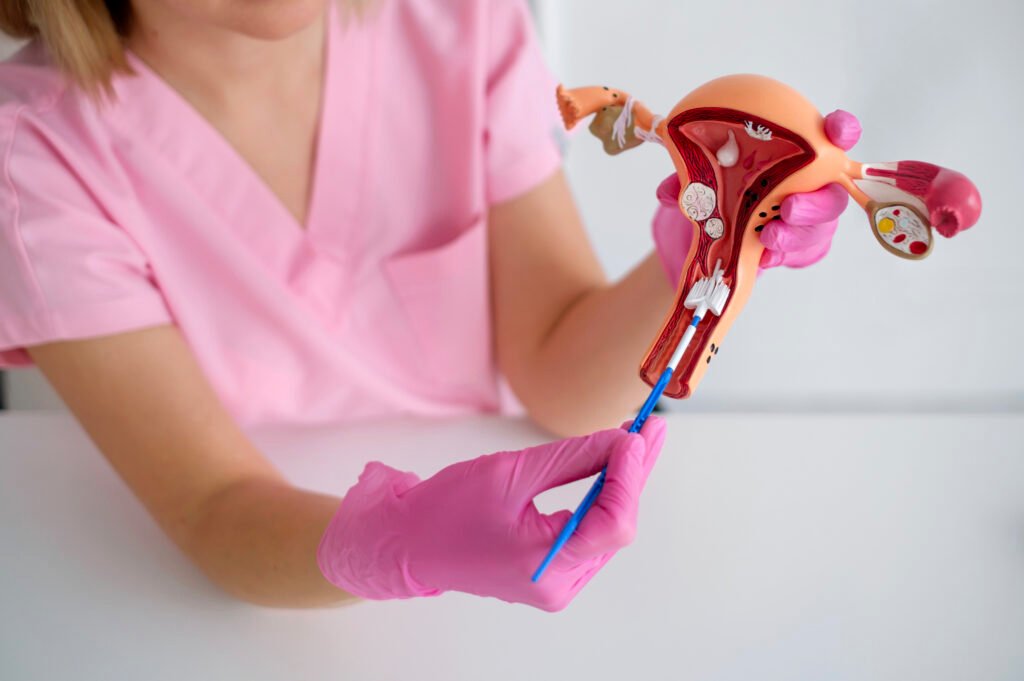Explore endometriosis, its symptoms, causes, and how targeted nutrition, lifestyle changes, and proper care can improve quality of life.
March is Endometriosis Awareness Month. Endometriosis affects an estimated 1 in 10 women worldwide, yet it remains underrecognized and often misunderstood.
Do you experience:
- Intense pain before and during your period?
- Chronic pelvic pain or discomfort during ovulation?
- Bloating and intestinal issues resembling IBS?
These symptoms could point to endometriosis, a chronic condition that significantly affects quality of life—physically, socially, and psychologically.
What is Endometriosis?
Endometriosis occurs when the tissue that lines the uterus (endometrium) grows outside of it, attaching to other organs such as the ovaries, fallopian tubes, peritoneum, intestines, or bladder. This abnormal growth causes chronic inflammation and can result in:
- Severe pelvic pain and menstrual cramps
- Heavy or prolonged periods
- Pain during intercourse
- Chronic fatigue
- Insomnia
- Infertility
- IBS-like symptoms such as bloating, gas, or altered bowel habits
The misplaced endometrial tissue behaves like normal uterine tissue: it thickens, breaks down, and bleeds with each menstrual cycle. However, because it has no way to exit the body, it becomes trapped, leading to complications such as cysts, adhesions, and fibroids.
This is not “normal period pain” and should not be dismissed. Severe menstrual pain (dysmenorrhea) requires thorough investigation.
What Causes Endometriosis?
Endometriosis is a multifactorial condition influenced by various factors:
- Chronic Inflammation: The condition is fundamentally inflammatory, often affecting the intestines as well.
- Gut Dysbiosis and IBS: Studies have linked endometriosis to gut health issues, including dysbiosis, SIBO, and IBS-like symptoms.
- Diet: Diets high in sugar, refined carbohydrates, bad fats, and processed foods can exacerbate inflammation and worsen symptoms.
- Liver Function: A sluggish liver—due to excess toxins, medications, or alcohol—affects estrogen metabolism, leading to hormonal imbalances.
- Hormonal Imbalance: Excess estrogen promotes the proliferation of endometrial cells and worsens inflammation.
Every woman with endometriosis is unique, and identifying the root cause is crucial for effective management.
The Role of Diet and Lifestyle in Managing Endometriosis
How Important Is Correcting Your Diet and Lifestyle?
It is extremely important. Since endometriosis is driven by inflammation and high estrogen levels, diet and lifestyle can either aggravate or alleviate symptoms. An anti-inflammatory diet, combined with lifestyle changes, can help:
- Balance hormones
- Support liver detoxification
- Reduce exposure to environmental estrogens and endocrine disruptors
These measures are particularly effective in reducing symptoms and improving quality of life until menopause when endometriosis often resolves naturally.
Dietary Strategies for Endometriosis
A poor diet refers to one that:
- It is pro-inflammatory, rich in refined carbohydrates (e.g., white flour, processed foods)
- Lacks nutrient-dense, organic foods free from chemicals and pesticides
- Contains unhealthy fats like margarine or processed oils
On the other hand, a strategic, nutrient-rich diet can significantly reduce symptoms.
Example of a Strategic Meal for Endometriosis:
- Main Dish: Risotto with sautéed artichokes
- Side: Thinly sliced raw fennel, dressed with extra virgin olive oil and unpasteurized apple cider vinegar
Why This Works:
- Carbohydrates at Dinner: Gluten-free rice supports the liver’s nighttime detoxification processes and promotes better sleep, which helps reduce stress and inflammation.
- Artichokes/Endives: Rich in compounds that support liver and gallbladder function while promoting intestinal peristalsis.
- Anti-inflammatory Spices: Adding turmeric or saffron boosts the dish’s antioxidant and anti-inflammatory properties.
- Apple Cider Vinegar: Improves insulin sensitivity and maintains proper stomach acidity for optimal digestion.
Key Takeaway
Endometriosis is a complex condition requiring a multifaceted approach. While medical interventions like surgery or hormonal therapies are often necessary, addressing inflammation, gut health, and hormonal balance through diet and lifestyle can significantly improve outcomes.
Remember: Seek medical help for severe symptoms and work with healthcare professionals to identify the root causes and develop a personalized plan.

Dr. Giovanna Maraula
Functional Nutritionist and Lifestyle Medicine Practitioner.
From battling my own health struggles to regaining balance through science and nutrition, my journey led me to create a method that’s transforming lives—naturally.











